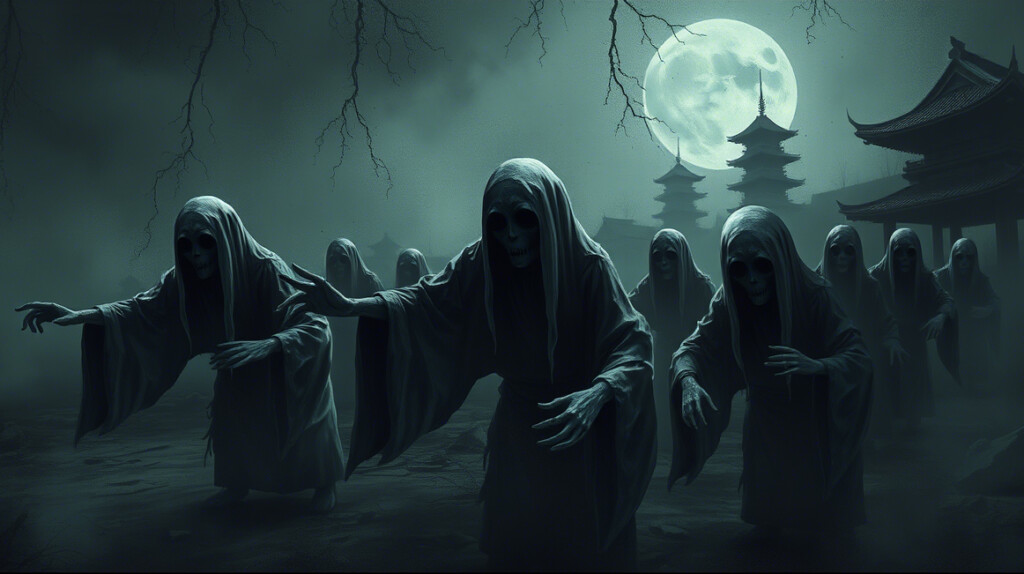Have you ever woken up in the middle of the night with a rumbling stomach? If so, congratulations, you’ve experienced a tiny taste of what the VIP guests of another world endure – the Gaki, or ravenous spirits of Japanese folklore. But trust me, your hunger pangs are a walk in the park compared to what these wretched beings go through. At least you can raid the fridge and whip up some instant noodles. Gaki? Well, let’s just say they’re not so fortunate…

The Flawed Embodiment of Suffering
These tormented souls—also known as ngạ quỷ or hungry ghosts—are far from beauty contest material. Picture a supermodel fused with… an overinflated balloon, then add a neck so thin even a bubble tea straw would seem robust in comparison. Oh, and don’t forget their perpetually blazing mouths—ensuring that anything they attempt to eat is instantly reduced to ashes, whether they enjoy barbecue or not. Talk about terrible luck!
Such grotesque forms aren’t random misfortunes. They are the result of misdeeds in past lives—stinginess, greed, and a reckless disregard for food. Those who hoarded wealth, wasted provisions, or exploited others now find themselves cursed with an insatiable hunger, eternally shackled to their cravings.
The Tale of the Gluttonous Heiress
Once upon a time, there was a privileged young lady with a rather unrefined habit—she devoured food in excess yet remained absurdly picky. Anything that didn’t meet her standards was discarded without a second thought, despite countless others longing for a single meal. But as fate would have it, karma always comes full circle.
When she passed away, her indulgent ways earned her an immediate descent into the realm of starving spirits, transforming her into one of these pitiful creatures. Her belly swelled like a festival drum, yet her throat had shrunk to a mere pinhole. Each time she attempted to eat, her meal erupted into flames, burning her from the inside out. If you think enduring a bad meal is torture, imagine being doomed to eternal starvation.
If the bloodthirsty Jubokko haunt battlefields, then Gaki reign as the undisputed monarchs of unrelenting hunger—an agony as ceaseless as an empty stomach that can never be satisfied.
Segaki – When the Temple Buffet Opens for Lost Souls
The legend of these tormented spirits, while eerie, carries a deeper message about karma—how good and bad deeds shape one’s fate. The Japanese, known for their nuanced philosophies, devised a way to ease the suffering of these wandering spirits through the Segaki ritual.
Held during Obon (盂蘭盆会)—akin to the Hungry Ghost Festival in other Asian traditions—this ceremony offers a special vegetarian feast dedicated to lost souls. Monks chant prayers while offerings of food and drink are prepared in hopes of satiating the restless and guiding them toward liberation.
Hungry Ghosts Across Asia
Japan isn’t the only culture with tales of famished phantoms. Similar beings exist throughout Asia, reflecting shared beliefs about karma and excess. In Buddhist traditions, Preta—the possible ancestors of Gaki—are depicted with identical emaciated frames and cursed appetites. Meanwhile, Dokkaebi (도깨비) in Korean folklore, though mischievous rather than tragic, sometimes share their association with fire and punishment. In China and Vietnam, Ma đói (餓鬼) appear in ghost stories as cautionary figures, reinforcing moral lessons on greed and wastefulness.
Though unique in form, Japan’s interpretation of the ever-hungry specter aligns with this broader spiritual motif found across the continent.
Gaki – A Symbol of Greed or a Lesson Worth Learning?
At first glance, these tales may seem like mere folklore—just chilling bedtime stories. But before dismissing them, take a moment to reflect: Have we ever become a version of a Gaki ourselves? The endless desire for more, the wastefulness, the envy—aren’t these modern-day afflictions just as haunting?
Whether or not these spirits truly roam the earth is beside the point. What matters is the wisdom behind their legend: that in life, a little moderation, a little generosity, might just save us from becoming a Gaki—not only in the afterlife, but in the world we live in today.
